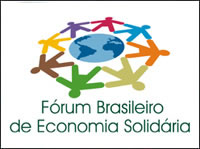Although extremely recent, the Brazilian Forum of Solidarity Economy (FBES) is an inspiration which is also rich in lessons on how to organize oneself as a network.

At the time of the first World Social Forum held in Porto Alegre in 2001, participants from various areas of Brazil decided to work together to construct of a common platform in order to build an alternative economy to the dominant neo-liberal one. Two years of debates will have been necessary in order to agree on a charter of principles and a common platform.
Created in June of 2003 during the III Brazilian Solidarity Economy Plenary Meeting, the Brazilian Forum of Solidarity Economy (FBES) is nowadays the national authority in charge of the organization, discussions, preparation of strategies and mobilization of the Solidarity Economy movement in Brazil. The FBES represents the Solidarity Economy movement regarding the public authority (at federal, state and local level, through its National Coordination and the State and Local Forums), and domestic and international organizations, networks and associations.
Brazil is a vast country of more than 180 million inhabitants, divided in 27 states. Thus, the FBES created its organization based on Forums in each of the 27 states and 16 national organizations or entities. The National _ Coordination is made up of 97 people, three per state and 16 from the other organizations. This coordination meets twice per year. Furthermore, a National Executive Coordination comprised of 13 individuals ensures a regular follow-up of the FBES. In support of the FBES, a National Executive Secretariat composed of 3 persons supports and leads the whole, ensures the information flow, in particular through a newsletter distributed to over 4000 subscribers.
President Lula, elected in 2002, carried out his promise to create a National Secretariat the Solidarity Economy (SENAES). The FBES and the SENAES organized eight joint Work Groups (WG) in order to concretely promote Solidarity Economy in Brazil: communication, geographic census, legal frameworks, public policies, production, marketing and consumption, international relations, solidarity finances and training.
At present, the FBES is very active in order to promote legislative changes. The years of dictatorship did not favour a suitable legislative framework. Therefore, more than 50% of the 14,000 companies listed are associations. However, the legal framework of associations is not adapted to specificities and the diversity of the businesses of solidarity economy. In the same way, the law of cooperatives, instituted during those years, supports mostly large cooperatives (mainly agri-business). For example, one needs a minimum of 21 members to create a cooperative and the requirements of incorporation and other formalities are such that they put a brake on solidarity economy ventures. Thus, only 8% of the listed businesses are cooperatives.
In June, a first national Conference of scale took place, gathering more than 1,200 participants designated by the forums in the 27 states. In the weeks which preceded this Conference, more than 10,000 people took part in these 27 official state forums.
The Conference was convened by three Departments: Social Development, Agriculture Development, and the SENAES (which is the Department for Employment and Work). The FBES was responsible for a vast movement of mobilization in the states, in order to assure debates and to broaden the participation of the actors of the civil society and the local governments which were not yet aware of Solidarity Economy. The topic of this Conference was: Solidarity Economy as a strategy and policy of development.
It is interesting to note that the BFSE does not yet have the status of a legal association. However, this does not prevent it from having an operation of scale. In comparison with what we know elsewhere, it is undoubtedly possible to say that it is a network, even an organization.
The word “forum” was retained because its original meaning signifies “public place”. Dictionaries give the following definition: “a place where a people held their assemblies and where the public affairs were discussed”.
This article was written following exchanges and discussions with the executive secretary of the FBES, Daniel Tygel, during his mission in Quebec and elsewhere in Canada last May 15th – 27th. A text presenting FBES is available at the following address: www.fbes.org.br/internacional
Author: Yvon Poirier
Sustainable Local Development : Newsletter # 30
Contact: ypoirier


